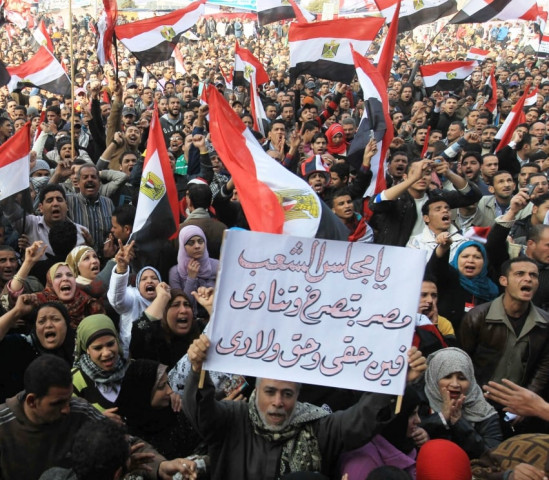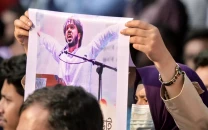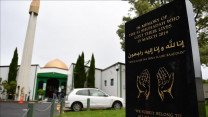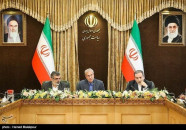A year after uprising, Egyptians celebrate and protest
United last year by popular anger at Mubarak, Egyptians gathering on the January 25 anniversary were in high spirits.

United last year by popular anger at Mubarak and his 30-year rule, Egyptians gathering on the January 25 anniversary were in high spirits but divided between activists demanding a swift end to army rule and Islamists celebrating their dramatic change in fortunes after emerging victors in a parliamentary election.
One group of mostly youths in Tahrir stood near a street where protesters clashed in November and December with police and the army, chanting "Down with military rule" and "Revolution until victory, revolution in all of Egypt's streets".
With the 83-year-old Mubarak on trial for his life but a new parliament installed this week that is dominated by his Islamist adversaries, some of the youthful activists who turned to the Internet to launch last year's revolt are disenchanted, weary of army rule but fearful the Islamists may also stifle their hopes.
Protesters mistrust the military council that took charge on February 11 last year when Mubarak was driven out and which is led by his defence minister for two decades, Field Marshall Mohamed Hussein Tantawi. The army has vowed to relinquish power after a presidential poll in June.
At the other side of Tahrir, a vast plaza where protesters fought fierce battles with police during the 18-day uprising last year, supporters of the once banned Muslim Brotherhood and other Islamists grouped to celebrate.
"I'm very happy with the anniversary of January 25. We never dreamed of this. The revolution's victory was reaped with the elected parliament," said Khaled Mohamed, 41, a member of the Brotherhood whose Freedom and Justice Party (FJP) secured the biggest bloc in parliament after the first free vote in decades.
A member of the Brotherhood's party now sits on the speaker's chair, an idea unimaginable a year ago when the lower house was a compliant, rubber-stamp body stuffed full of Mubarak's supporters. The assembly also has a strong contingent of ultraconservative Salafi Muslims.
However, some liberal activists fear the Brotherhood and other Islamists are colluding with the army to entrench their position in mainstream politics at the expense of a deeper purge of the old order. Islamists dismiss talk of any such alliance.
The United States, a close ally of Egypt under Mubarak, praised "several historic milestones in its transition to democracy" this week, including the convening of parliament.
"While many challenges remain, Egypt has come a long way in the past year, and we hope that all Egyptians will commemorate this anniversary with the spirit of peace and unity that prevailed last January," a White House statement said.
Autocratic ways
But pro-democracy activists doubt the army's intentions and fear it wants to cling on to power from behind the scenes even after a president is elected. Some cast envious glances toward Tunisia, whose successful revolt last January inspired the Egyptians and which has now moved directly to civilian rule.
The activists in Egypt point to a surge in military trials of civilians and the use of violence against protesters as signs of autocratic ways similar to three decades under Mubarak.
When the army was ordered onto the streets after days of clashes with police during the uprising, the troops were hailed and cheered. Many Egyptians have since watched in horror as soldiers have dragged, beaten and fired tear gas at demonstrators demanding that the army return to its barracks.
Tantawi defended the military during a televised speech on Tuesday: "The nation and the armed forces had one aim: for Egypt to become a democratic state," he said.
Along with demonstrations in Cairo, Egyptians also gathered in the northern city of Alexandria and in Suez, scene of some of the fiercest violence during the revolt and also the place where the first death was reported during the uprising.
"We didn't come out to celebrate. We came out to protest against the military council and to tell it to leave power immediately and hand over power to civilians," said Mohamed Ismail, 27, in Suez, a port city east of Cairo.
There were no official numbers for Wednesday's turnout. But some witness estimates put the number in Tahrir at 150,000 or more although there was a constant flow of people in and out of the square. Thousands were also out in other areas of Cairo.
Demands for justice for the "martyrs of the revolution" was one of the unifying calls for all demonstrators on Wednesday. Banners with pictures of those killed in the uprising were hung from lamp-posts in Tahrir.
Many are angry that no one has yet been found responsible for the deaths of 850 people during the uprising. A trial of Mubarak, his interior minister and others officials continues.
"Martyrs, sleep and rest. We will complete the struggle," chanted protesters in Alexandria.
Despite unity on that issue, there were signs of friction even late on Tuesday as people began congregating in Tahrir, pitching tents in winter rain.
"The military council is Mubarak," said Amr alZamlout, a 31-year-old protester clutching a sign declaring "there is no change" and stating his aim was to topple the army rulers.
Mohamed Othman, an accountant, stopped to put forward a different view based on the idea that Egypt needs stability for economic recovery, not more protests: "The council will leave power in any case. Sure, the revolution is incomplete, but it doesn't mean we should obstruct life," he said. His criticism quickly drew a crowd and touched off an argument.
In an apparent attempt to appease reformist demands, the military council has in recent days pardoned some 2,000 people convicted in military courts since Mubarak was deposed. On Tuesday it announced a partial lifting of a state of emergency.
But it kept a clause saying emergency laws in place since 1981 would still apply in cases of "thuggery", a vague term that triggered calls for clarification from Washington and more criticism from human rights groups.



















COMMENTS
Comments are moderated and generally will be posted if they are on-topic and not abusive.
For more information, please see our Comments FAQ